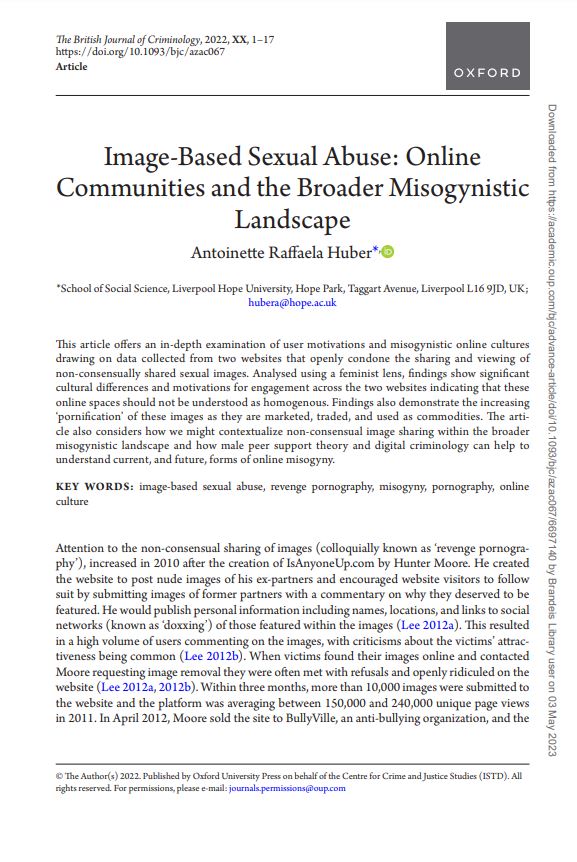Violence
Image-Based Sexual Abuse
 Full Article Title: Image-Based Sexual Abuse: Online Communities and the Broader Misogynistic Landscape
Full Article Title: Image-Based Sexual Abuse: Online Communities and the Broader Misogynistic Landscape
Open Access: No
Abstract
This article offers an in-depth examination of user motivations and misogynistic online cultures drawing on data collected from two websites that openly condone the sharing and viewing of non-consensually shared sexual images. Analysed using a feminist lens, findings show significant cultural differences and motivations for engagement across the two websites indicating that these online spaces should not be understood as homogenous. Findings also demonstrate the increasing ‘pornification’ of these images as they are marketed, traded, and used as commodities. The article also considers how we might contextualize non-consensual image sharing within the broader misogynistic landscape and how male peer support theory and digital criminology can help to understand current, and future, forms of online misogyny.
Relevance
This study showed that the line between normative legal pornography and illegal “revenge porn” (non-consensual intimate images, or image-based sexual abuse or “IBSA”) is increasingly blurred. “Whilst these images [IBSA[ are not considered to be forms of pornography by academics and victims, this research suggests that images are being used and marketed as pornography creating a ‘pornifcation’ of image-based sexual abuse.” The two websites investigated that were devoted to IBSA (MyEx and AnonIB) “had a striking similarity to mainstream pornography websites.” The “objectifcation and dehumanization of women found on these [IBSA] websites mirror the types of objectification feminists identified in mainstream pornography in the 1980s.” “Examination of the [IBSA] websites clearly demonstrated an overt willingness of users to employ this kind of derogatory, misogynistic, objectifying, and dehumanizing language to abuse and judge women. In doing so, we find typical pornographic language and culture permeating users’ reactions to these images.”
Citation
Huber, A.R. (2022). Image-Based Sexual Abuse: Online Communities and the Broader Misogynistic Landscape. The British Journal of Criminology, azac067, 1-17. https://doi.org/10.1093/bjc/azac067
